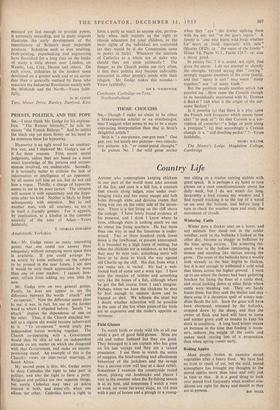Wintering Cattle
Winter puts a thicker coat on a horse, and any animals that stand out in the colder weather, such as the bullocks I looked at the other day, become as shaggy as buffaloes by the time spring arrives. The wintering fat- stock were in the hollow ruminating by the stream and standing like statues among the gorse. The coats of the bullocks have a woolly look already as the hair begins to thicken, but it is not enough to withstand a cold wind that blows across the higher ground. I went up to see where the farmer had been gathering bracken for lining the floor of a cattle shed, and stood looking down at other fields where cattle were standing out. They are hardy beasts these, but they seek the shelter and stay • there even if a deceptive spell of wintry sun- shine floods the hill. Soon the grass will have been shortened, trimmed by the bullocks, cropped down by the sheep, and then ,the owner of flock and herd will have to come, and scatter green stuff or swedes to keep his stock in condition. A long hard winter means an increase in the time that feeding is neces- sary, reduces the weight of the cattle and makes stock rearing less of a proposition than when spring comes early.


































 Previous page
Previous page